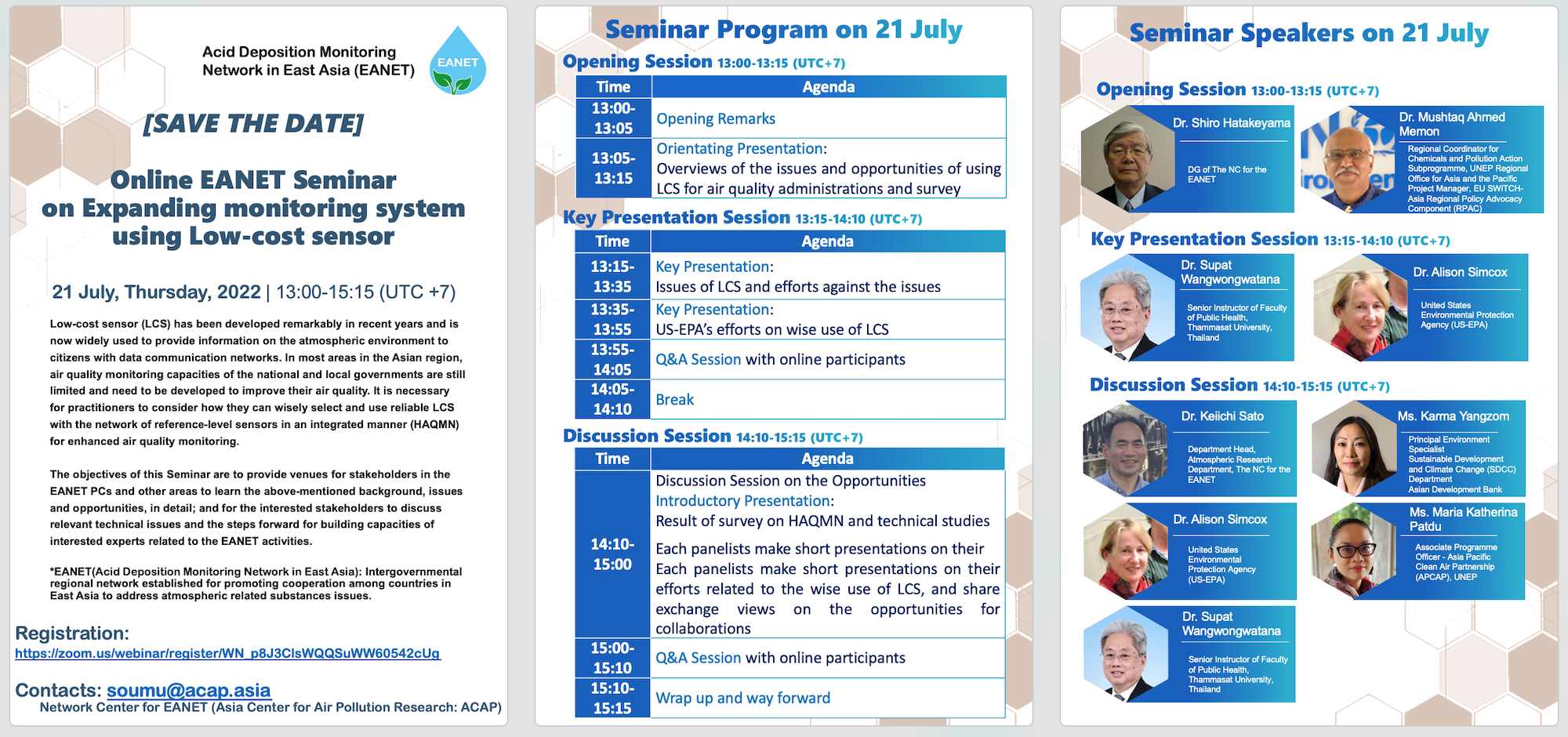EANET Seminar on Expanding Monitoring Systems using Low-Cost Sensor (LCS) – Join us on July 21st!

.
The registration is now closed.
.
1. Background
Low-cost Sensor (LCS) technology to measure air quality has expanded remarkably in recent years, and it is now widely used by the private sector. It provides information on the atmospheric environment to citizens through data communication networks.
Noticing the cost-effectiveness of LCS, international organizations have started to promote the use of LCS in selected areas to strengthen the capacity of governments where official air monitoring networks are insufficient. However, various surveys conducted by US-EPA, the EU, and others, as well as some experiences in the Asian region reveal that some types of LCSs in the market have problems with accuracy and reliability, while some types are reliable. It is observed that some less reliable LCS and improper use of LCS, including wrong interpretation of measured data, sometimes cause problems including unnecessary social confusion.
Air quality monitoring authorities, such as US-EPA, recommend that LCS is to be used for providing supplementary information for non-regulatory purposes. They recently developed testing protocols to evaluate the accuracy and reliability of LCS.
In most areas in the Asian region, air quality monitoring capacities of the national and local governments are still limited and need to be developed to improve their air quality to achieve SDGs. Considering emerging sub-regional-scale and serious seasonal air pollution events, such as PM2.5, building a network of reliable and internationally comparable air quality data becomes more important.
Thus, it is necessary for practitioners to consider how they can wisely select and use reliable LCS with the network of reference-level sensors in an integrated manner for enhanced air quality monitoring.
The EANET has been developing an air quality monitoring network in the East Asia region with governments and scientists from its 13 Participating Countries and assisting them to develop domestic capacity. The EANET is expanding its scope and seeking collaboration with potential partners. The EANET is conducting this activity considering the best use of reliable LCS for capacity building among its Participating Countries.
.
2. Objectives and Participants
The EANET will proceed with technical studies and capacity building on methods for collecting reliable air quality data with a concept of Hybrid Air Quality Monitoring Network (HAQMN) where highly reliable LCS and existing reference-level monitoring equipment are used in an integrated manner.
This concept and relevant work provide opportunities for EANET: (1) to strengthen its monitoring network, especially in expanding spatial coverage of the motoring of PM2.5 and ozone with high time resolution; and (2) to assist the Participating Countries of the EANET in developing their air quality monitoring network.
With such overarching goals, the objectives of this Seminar are to provide venues for stakeholders in the EANET Participating Countries and other areas to learn the above-mentioned background, issues, and opportunities of LCS in detail from the experiences of the air pollution monitoring experts.
Although this event is open to the public, the expected participants will be mainly representatives, experts, and practitioners of air quality monitoring from the EANET Participating Countries, non-Participating Countries, academia, and monitoring related service providers.
.
3. Agenda
.
Download the Concept Note and Programme here.
.
Download the Workshop’s presentations:
–Issues of LCS and Efforts Against the Issues: Thailand’s Experiences (presented by Dr. Supat Wangwongwatana)
–US-EPA’s efforts on wise use of LCS (presented by Dr. Alison Simcox)
–Results of the survey on HAQMN and technical studies in some EANET Participating Countries (presented by Dr. Keiichi Sato)
–Experience in using Low-Cost Sensors under ADB TA 9608 (presented by Ms. Karma Yangzom)
–Air quality data challenges and opportunities in developing Asia (presented by Ms. Maria Katherina Patdu)
.
For further inquiries, contact the Network Center for the EANET.
